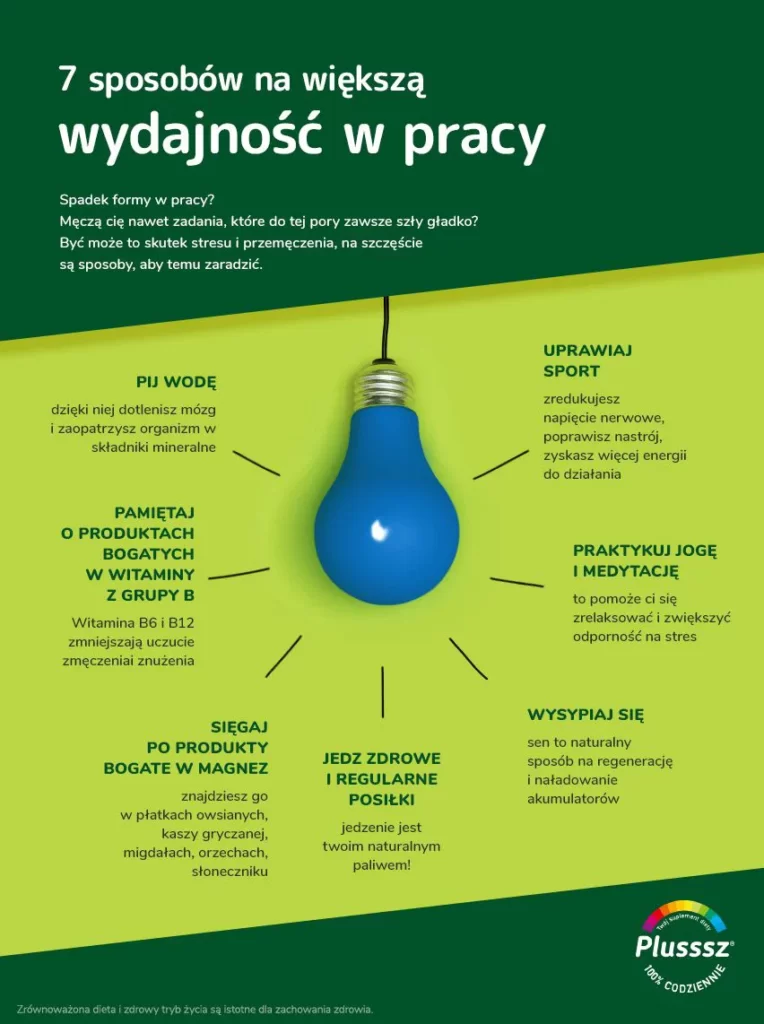Many hours spent in a sitting position – at a desk, during mental work, negatively affects the well-being and mood of professionally active people. In the daily rush and excess of duties, it is easy to neglect proper habits. Stress does not help with concentration and focus, which can lead to a vicious circle and an increasingly worse well-being for some people.
Ensuring an adequate supply of vitamins and minerals helps to alleviate the effects of stress and high professional activity, which are burdensome especially for office workers, decision-makers or scientists who must constantly maintain good mental shape.

Fig. 1. Proper habits and a healthy diet help you stay in good shape at work.
Characteristics of office and mental work
Office and mental work are associated with specific factors that can affect well-being and lower mood. These include:
- Work in a forced body position – a person naturally needs movement to function properly. The characteristics of the work that people most often do have changed significantly in recent decades, evolving from work in constant movement, consisting mainly of performing duties associated with physical effort – to work performed in a sitting position, which is not accompanied by additional movement activating many body structures.
- Working with a computer – is associated with making movements to a limited extent.
- Lack of contact with nature and sufficient daylight – this factor is particularly noticeable for employees in the autumn and winter period, when working in the office for an average of 8 hours a day does not allow for exposure to the sun, which sets very early in winter.
- Working in air-conditioned offices among many people – office work often involves staying in the so-called open space, i.e. a common space for many office workers who simultaneously work there mentally, answer phones or conduct meetings at desks in small groups. Working in an open space involves long-term stays in a room with dry, artificially filtered air. Being among many people, in noise, contributes to a deterioration of well-being and an increase in stress levels. Concentration in such conditions is particularly difficult.
- Stress, burden of duties – the modern labor market promotes flexibility and the ability to dynamically adapt to working conditions and perform new, sometimes unusual duties for a given job position. At first, working in such conditions is exciting and dynamic, but over time it can be difficult for the employee who is afraid that it will be difficult to meet the ever-increasing expectations and work environment.
All of these factors are normal and related to professional activity, but if they are particularly persistent or last for many months (and in extreme cases even many years), then they can lead to a decrease in commitment and effectiveness at work.
People who do their work with passion, out of love or who are seriously thinking about career development and climbing the next rungs of the professional or scientific ladder care about maintaining high effectiveness at work for as long as possible – if you are in this group, take a look at your daily habits and make changes. If you find that, for example, your supply of vitamins and minerals is too low, you sleep irregularly, and the only ways to increase effectiveness that you use are sweet snacks, coffee and energy drinks, take a look at your diet and daily habits. Maybe it’s time for a change?
Long-term stress and bad habits related to nutrition, exercise and rest have a negative impact on your well-being. Do you feel constantly tired and bored with your daily professional duties? Do you find it hard to get up for work in the morning, and in the afternoons you feel like the hours drag on endlessly, with the work still not finished and the deadline looming?

Fig. 2. Fatigue and weariness at work are common.
Take a look at your diet. Too low a supply of vitamins and minerals can be responsible for problems with concentration and low efficiency. In the daily rush and working under time pressure, it is difficult to take care of regular meals. If you do not eat every 3-4 hours, the level of “fuel” in your body drops – and you feel that you have no energy. If the situation lasts, it can lead to the formation of excess body weight.
Did you know that even obese people can show signs of malnutrition? By eating highly processed, low-quality food, you do not provide your body with valuable “fuel” for action – you only consume empty calories.
Lack of exercise is another cause of poor well-being and bad days at work. Studies conducted in the past have shown that regular physical activity reduces the risk of episodes of low mood and allows you to get through the autumn and winter period more easily, when insufficient daylight causes drowsiness, fatigue and lack of energy to act.
Don’t like exercise? That’s impossible! From the wide range of fitness clubs and places where you can do physical activity, you will definitely find something for yourself. Don’t be discouraged after the first unsuccessful attempts. Maybe running or aerobics are not for you, but maybe you will find yourself with Nordic walking or love dancing? All of these activities, especially when done in a group, with loved ones or friends, have a chance to have a positive impact on your well-being and effectiveness in everyday, professional activities.
When doing sports, remember to properly hydrate and replenish the minerals that you lose during intense physical effort along with sweat. If you are planning particularly intensive exercises or exercise in difficult weather conditions, e.g. outdoors in the sun and heat, take care of proper hydration.
Sometimes water alone is not enough – it is difficult to drink it often and in small sips during sports. Preparations containing additional minerals will hydrate the body in a more convenient way. You can choose a preparation from a convenient company – effervescent tablets, which are easy to throw into a sports bag.
Strengthen your mental resistance, overcome stress!
Prolonged, chronic stress is a factor that undoubtedly has a negative impact on well-being and even the functioning of individual organs and systems. Many scientific studies have proven the negative impact of chronic stress, e.g. on the functioning of the nervous system and the circulatory system.
Studies published in the journal “Przegląd Kardiologów”, in an issue published in 2001, proved that even short-term stress associated with everyday activities and duties, e.g. a visit to the dentist, causes changes in the human body and can negatively affect the physiology of the heart and the entire circulatory system.
Everyday problems and the stress associated with them are considered normal and most people who experience their unpleasant effects claim that they need to be accepted – after all, such stress is part of our everyday lives. This is not true, in every situation where you can effectively reduce the stress you feel, try to do so. Over time, the methods of reducing everyday stress will “become your blood” and you will use many of them effortlessly, intuitively.
How to fight stress? Effectively! The first step to change is to become aware of the problem that concerns you. Some people affected by chronic stress ignore the problem and their own poor well-being.
Yoga and meditation, like intensive physical exercise, allow you to control stress. For many people, this type of activity may be associated with discomfort related to the specific atmosphere during classes and the high focus of the leaders and participants on the spiritual sphere, which they do not want anyone to interfere with. A lighter form that will also allow you to deal with stress are breathing exercises. How to do them? Many forms of breathing exercises have been described in the literature.
To start with, before you find the best one for you, take care of the foundation, which is conscious breathing – all you need to do in a stressful moment is hold your breath for a dozen or so seconds, retaining the air in your lungs, and then slowly exhale through your nose. Repeating such conscious inhalations several times helps reduce stress in everyday situations – try this method while standing in line at a store, on the road, waiting in a traffic jam or during stressful situations at work, e.g. after a difficult conversation with co-workers.

Fig. 3. Yoga and meditation can reduce stress.
How else can you strengthen your mental resilience? With diet! Regular meals are very important. Try not to extend the time between subsequent portions of food to more than 3-4 hours. Make sure that your diet is properly balanced and contains ingredients that help fight the feeling of tiredness and fatigue at work – where can you find them? In green vegetables, fruit and whole grains.

Fig. 4. Spinach is a good source of magnesium in your diet.
If you want to increase the efficiency of your mental work, give up popular “boosters”. Coffee and tea drunk in excess have a negative effect on magnesium levels. Energy drinks are widely considered an easy and convenient way to increase work efficiency and maintain focus for many hours. If you decide to include them in your diet, pay attention to their quality. Pay attention to the sugar content added to the meals you eat.
Sugar (sucrose) is quickly absorbed into the bloodstream, causing sudden stimulation. Unfortunately, this effect is short-lived – after a short time, there is a sudden drop in blood glucose levels, then you feel very sleepy, tired, bored and unable to complete the tasks you are working on.
What vitamins and minerals have a positive effect on energy levels and reduce the feeling of fatigue?
First, take a close look at your diet. Incorrect levels of vitamins and minerals are not conducive to well-being and efficiency at work.
Everyday mental work requires proper nutrition of the body. Therefore, any strongly reducing diets, based on a large calorie deficit, or even fasting used by some, can negatively affect mental performance at work. It is not worth using them.
A balanced diet based on vegetables, dairy products and whole grain products will not only contribute to a nice figure, but will also have a great effect on well-being – mental and physical.

Fig. 5. Concentration for many hours and not feeling tired at work help achieve professional goals.
According to the guidelines of Scientific Societies and the World Health Organization (WHO), a daily diet should include 5 portions of vegetables and fruit, which together should amount to about half a kilogram.
Vegetables contain fiber, water important for hydration of the body and a number of vitamins that affect your well-being. If you experience energy drops and poor well-being at work, prepare a portion of chopped carrots, fruit or nuts that will improve your mood, give you energy for work and will not pose a threat to your body weight. Nuts and some vegetables also contain magnesium, which helps reduce the feeling of fatigue during work.
When composing a diet with a view to improving efficiency, reducing the feeling of fatigue and weariness, consider minerals and vitamins that have proven beneficial effects. These include magnesium and B vitamins – thiamine, niacin, vitamin B6 and B12, and biotin.
Where to look for them? Check out the rest of the article, where you will find the answer to the question of where to look for magnesium and how to compose meals to ensure that you get the amount that meets your daily requirement for this ingredient.
Sources of magnesium in the diet
A properly balanced, healthy diet should be based on unprocessed grains. Products such as dark bread, dark pasta, and groats help ensure the proper functioning of the digestive system, prevent discomfort in the abdomen, and are a source of magnesium.
Dark bread contains much more of this ingredient than white, processed rolls and breads. It is estimated that half a cup of rye flour provides almost 30% of your daily magnesium requirement. When choosing bread with the intention of enriching your diet with magnesium, however, pay close attention to the quality of the products you choose.
Choose bread with seeds, such as pumpkin seeds, sunflower seeds, sesame seeds or chia seeds, which have recently become fashionable among fans of healthy eating. Such bread not only looks and tastes much better, but also provides important ingredients from the point of view of efficiency in work – B vitamins and magnesium.

Fig. 6. Choose good quality bread.
The vegetables that contain the most magnesium include:
- Green, leafy vegetables – e.g. spinach, kale and arugula (a type of lettuce) contain significant amounts of magnesium, regularly add them to meals, especially since they have very good taste and are easily available all year round. You will find slightly less magnesium in beet leaves and sorrel, but it is still worth enriching your diet with them and adding them to salads or the recently popular green juices and smoothies. If you like parsley, it is worth knowing that it also contains magnesium. Maybe you will dare to try the less popular, but equally rich in minerals and vitamins carrot leaves in a salad or on sandwiches?
- Sprouts and legumes – broad beans, peas, beans and lentils contain magnesium. 100 g of them on average provides about 20% of the demand for this element. Even if legumes have not been an important part of your diet so far, it is worth trying to sneak them into your daily meals. In addition to the content of minerals and vitamins, legumes and sprouts are a rich source of protein, which is so necessary for the proper functioning of the body and, for example, building muscle mass, which may be important for people who are professionally active and do sports.
When choosing vegetables to supplement your diet with magnesium and vitamins, pay attention to their quality and source. Only good quality vegetables from controlled crops, ripe and not stored for too long after are a good source of magnesium. Below you will find a table summarizing the magnesium content in some food products:
| Food product | Magnesium content in mg/100g |
| Oat flakes | 129 |
| Brown rice | 110 |
| Buckwheat groats | 218 |
| Spinach | 79 |
| Savoy cabbage | 47 |
| Parsley (leaf) | 69 |
Many scientific articles report that seeds and nuts are a good source of magnesium. It’s true. These products not only provide magnesium, but also omega acids and vegetable fats, which are essential for the proper functioning of the body and the absorption of vitamins A, D, E and K. Which nuts and seeds to choose? In the table below you will find information on the magnesium content in some nuts:
| Food product | Magnesium content in mg/100g |
| Sunflower (seeds) | 359 |
| Almonds | 269 |
| Pistachios | 158 |
| Hazelnuts | 140 |
And chocolate? Of course, cocoa and chocolate are also a rich source of magnesium, which is often an argument for people who like to reach for sweets during work. Cocoa contains an average of about 420 mg of magnesium in 100 grams. And chocolate? It depends on how much cocoa a given type of chocolate contains.
Of course, a cube or two of dark chocolate is a good snack that improves your mood and well-being, but remember that low-quality chocolate also contains processed fats and sugar, so choose dark chocolate with a cocoa content of at least 60-70%.
Water as a source of magnesium
Earlier, in the recommendations for sports and a healthy lifestyle, it was mentioned how important proper hydration is in the context of well-being, tiredness and fatigue during the working day.
Unfortunately, few people drink enough water to be properly hydrated. You can of course provide some fluids in your diet – vegetables, fruit, soups and juices contain a large amount of water, which is included in the daily balance. Despite this, to increase the body’s efficiency, you should regularly replenish fluids – preferably with water, not juices or coffee (they contain sugar or caffeine).

Fig. 7. Water can be a great source of magnesium in your diet.
Which water to choose? Of course, you can drink tap water, in most places in Poland it is safe to drink, even raw, directly from the tap. However, if you want to treat water as an additional source of minerals, it is worth choosing it carefully.
Always check the content of minerals on the label, do not drink spring water, only mineral water. Spring water often does not differ in composition from tap water – on the other hand, it contributes to the production of waste (plastic) and drains your wallet.
Of course, an important aspect is the taste, some people do not taste the water, for others some types may have such an intense taste that they discourage drinking it. When choosing mineral water for yourself, in addition to checking the magnesium content, also pay attention to whether the water you choose does not contain too much sodium.

Answers to the most frequently asked questions about productivity at work
Below are the answers to the most frequently asked questions about productivity at work and ways to deal with the feeling of tiredness and fatigue during everyday duties.
Is chocolate a good snack at work? It contains a lot of magnesium, which improves efficiency.
Chocolate is both a good and bad idea for a snack during the day. Why? Because it rarely contains the right amount of cocoa, what’s more, consumers often eat more than the recommended cube or two. As a result, they provide themselves not only with magnesium, but also saturated fats and sugar. It is better to choose nuts, which not only contain a lot of magnesium, but also have no sugar or saturated fats.
Does a vegetarian diet help achieve better results in mental work?
Yes, because a vegetarian diet contains a lot of vegetables, including legumes, which are a rich source of magnesium in the diet. What’s more, it is usually poor in processed products and fast food, which, if eaten regularly, can contribute to decreased efficiency and weight gain.
How to ensure the correct level of B vitamins and magnesium in your diet?
Take a look at your daily meals and their composition. Make sure that you eat often and regularly enough (every 3 hours). Choose healthy snacks and high-quality mineral water, which hydrates the body and is an additional source of vitamins and minerals.
A healthy diet is the basis of efficiency, you will quickly notice its beneficial effect on the body and your well-being. However, if it is too difficult for you to constantly monitor it or despite taking care to diversify your diet, you feel tired and fatigued, consider including a preparation containing magnesium and B vitamins in your habits. Some preparations available on the market also contain additional ingredients, e.g. coenzyme Q10.
What is the magnesium requirement of an adult?
An adult who leads an active lifestyle and is professionally active should provide their body with about 375 mg of magnesium per day. Pay great attention to properly balancing your diet and make sure that you are taking B vitamins at the same time as magnesium, which have a positive effect on its absorption.
Summary – good habits during work
If you are an adult, professionally active person, you do office work or other types of mental work (e.g. engineering), you certainly want to be efficient, full of energy and committed to the tasks performed while performing your duties.
Implementing small changes and healthy habits will allow you to stay focused and reduce the feeling of fatigue during work. What are these habits?

Fig. 8. Regular breaks at work help fight fatigue.
- Take regular breaks – taking a break from working at the computer for a while is healthy for the mind and allows you to return to your duties with renewed energy.
- Do exercises that are healthy for the eyes – look into the distance and move your gaze to individual objects, look out the window and fix your gaze on the greenery outside the window, this will allow you to relax and reduce stress, which has an inhibiting effect.
- Take care of a balanced diet, which is the basis of healthy functioning. Make sure that you supply yourself not only with magnesium, but also with vitamins from the B group,
- Get moving – movement is healthy and it is worth including it in your daily routine. The wide range of fitness clubs and places that activate sports will certainly allow you to find a form of exercise that suits you.
- Drink water – proper hydration of the body is extremely important for its functioning. If you choose bottled water, pay attention to whether it contains magnesium and whether the sodium content in 100 milliliters is not too high.
Bibliography:
- Guzik K., The Impact of Stress on the Circulatory System, “Forum Kardiologów” 2001, no. 2, vol. 6, pp. 53-57.
- Suliga E., Health Behaviors Related to Nutrition of Adults and the Elderly, “Hygeia Public Health” 2010, no. 45, vol. 1, pp. 44-48.
- Fraczek B., Gacek M., Grzelak A., Nutritional Support of Effort Capacity in a Group of Competitive Athletes, “Problemy Higieny i Epidemiologii” 2012, no. 94, vol. 4, pp. 817-823.
- Markiewicz R., Calcium and Magnesium in the Diets of Elderly People from the Podlasie Region, “Bromatologia i Chemistry Toxicologiczna” 2010, no. 42, vol. 3, pp. 629-635.
- Karmańska A., Stańczak A., Karwowski B., Magnesium Current State of Knowledge, “Bromatologia i Chemistry Toxicologiczna” 2015, no. 48, vol. 4, pp. 677-689.
A balanced diet and a healthy lifestyle are important for maintaining health.
